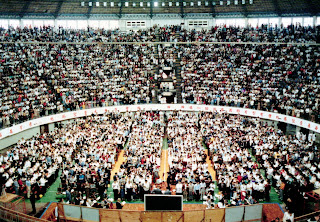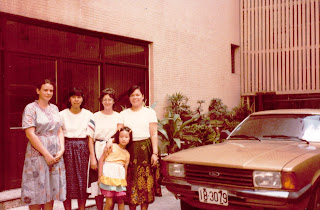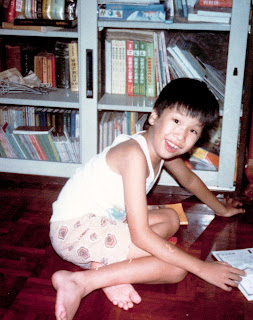 Company Bike Trip
Company Bike Trip

International Conference

We were paid by the month, and things were very lax as long as the work was done in a reasonable time frame. BUT when we had to produce materials on short notice, we worked around the clock seven days a week with no complaints until the job was done. The entire viewpoint was task-oriented, and as long as things were accomplished before the deadlines, no one minded if a person took a nap here or an afternoon there to handle personal or family business.
The company was very family oriented, and my colleagues would often bring their children or nieces and nephews to work with them when their personal lives so dictated. Everyone in the company took turns amusing the children or finding jobs for them to “help” out with until they left with their relatives on whatever business brought them to downtown Taipei. The staff of the company acted like an extended family to everyone else. If a person got sick and family members were unable to accompany him or her to the doctor, General Manager would find a colleague to take the sick person to the clinic. If there was a death in one colleague’s family, the company would shut down so everyone could attend the funeral. The same held true for weddings and other major life events.
The company functioned differently from its American counterpart. When the Americans came to town for a collaborative project, they put us all on a 9 to 5 schedule. Everything was run by the rule book, and they tried to whip us into shape. As soon as the Americans left, we went back to our old ways because they fit better into the pattern of the local society.
The Taiwanese work week went for six days. When there was an important project, nobody went home. When one department in the company got behind, everyone who had time went in to help out. Nothing was rigid, except that things had to be done before the deadline. Whenever we had a major accomplishment, General Manager would close down the company for a day and take us out to play. Sometimes, he would bribe us by taking us to play BEFORE the Americans came to make our lives miserable.
One time, we were supposed to go to the airport to meet the owner and a contingent of several hundred American visitors for a huge international conference. We worked for several months getting all the housing arranged, the outlines published, the meeting places set up, and making sure every detail was perfect. Since we had finished our preparations early, General Manager told us to arrive at work at 5 am the following morning with our uniforms for the airport on hangers plus a duffle bag of play clothes for three days. He then loaded us into three vans with walkie-talkies, and we took a three-day sightseeing trip over all of Taiwan’s cross-island mountain highways. We were supposed to be home in time to shower before going to the airport, but we had our clothes in the vans, just in case. We had a wonderful time with perfect weather for the first day and a half. Then it began to rain; by the time we got to the last cross-island highway, we got stuck between two landslides. The road was cleared several hours later, leaving us barely enough time to rush to the airport, run into the bathrooms, wash our faces, comb our hair, and put on crisp uniforms over dirty, unwashed bodies. Fortunately, the American guests were wiped out from the flight, so we saw them to their accommodations and got a good night’s sleep before starting to work around the clock again the next morning.
At the international conferences in Asia, I was clearly considered part of the Taiwan contingent. At times it was awkward because the Americans would come to me to complain about how we did things and expect me to relay their words to General Manager. By this time, I was immersed in the culture and didn’t see why things had to be done so rigidly. I also felt trapped in the middle because after the Americans went home, I still had to live with whatever enemies I had made from relaying unkind words. Fortunately, my Chinese friends were understanding and did their best to take the pressure off me. My thoroughly Asian attitude landed me a spot on the team of videographers filming conferences in Japan and Korea. These were Asian-only events, and no other Americans were invited to attend because the accommodations were in youth hostels and cheap hotels where you slept on mats on the floor. We were squeezed in four or six to a room, and in the Korean Youth Hostel, the bathrooms were down the hall. It was determined that the average American would be too uncomfortable in those surroundings. I got a free trip to Japan and Korea, and I was so happy. General Manager gave us time and money to sightsee in the down time between sessions, so life was even better.
General Manager was good to us, but he also felt free to interfere in our lives, such as meddling with our living arrangements. A group of young working women, whose families did not live in Taipei, needed safe accommodations like the Student Center. General Manager got the family I was living with to move into an office flat with these women. The family had three rooms in the corner, and the old area for the secretarial pool was screened off by a wall made of wooden closets. Twelve bunk beds were crammed into this room for all of us single women. The kitchen was on the balcony, and they installed shower heads into all the stalls with the toilets, so more than one person could shower at a time. Five women who slept early were given desks in the bedroom; the other seven of us had desks in a small separate room for night owls and students. Each woman had her own section of the closet wall with a large drawer, room to hang up clothes, and a shelf or two. We each got one shelf in the night owl room for books. Life at such close quarters was very difficult, but in the end it was not as bad as General Manager’s attempts at match-making.








